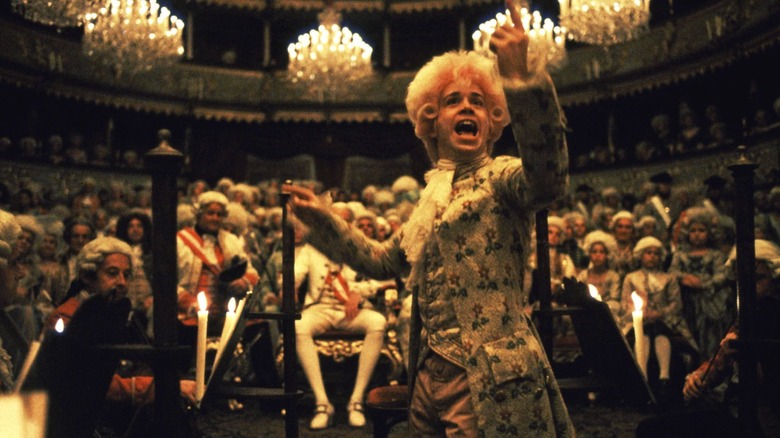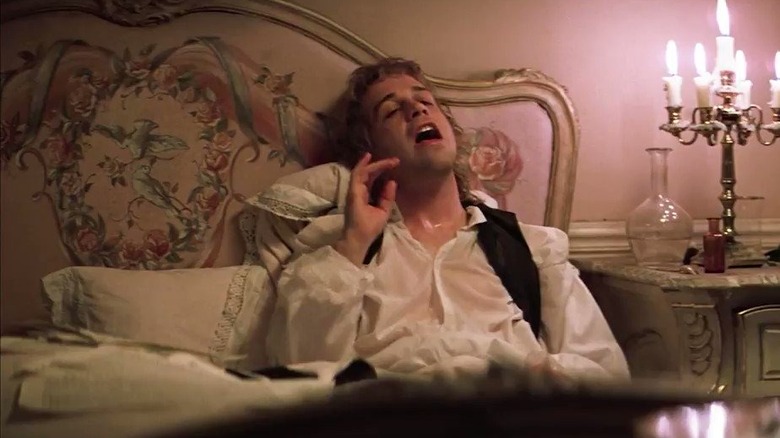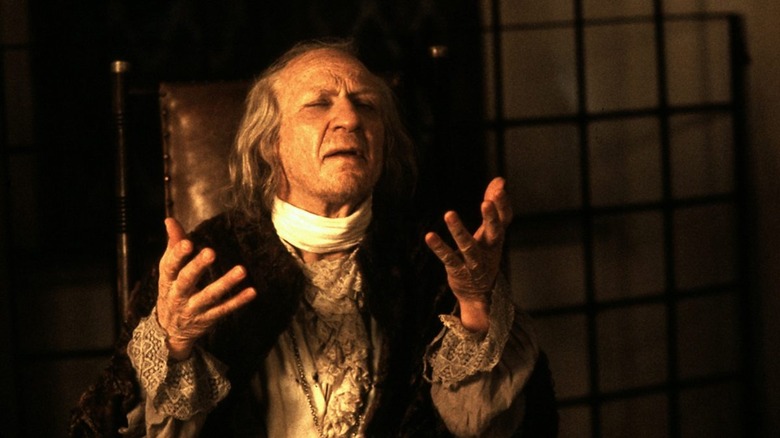Amadeus Ending Explained: In The Shadow Of Greatness
Director Miloš Forman frames his splendid 1984 epic "Amadeus" around the elderly Antonio Salieri's recollections of his life story to a young priest. Based on Peter Shaffer's triumphant stage play, the film takes several historical liberties to deliver a classic tale of jealousy. "Amadeus" follows a fictional rivalry between Salieri (played by an Oscar-winning F. Murray Abraham) and fellow composer Wolfgang Amadeus Mozart (Tom Hulce) at the court of Emperor Joseph II (Jeffrey Jones).
Salieri is consumed with envy and convinced that God is using him as a toy for His own amusement, allowing Salieri to recognize a musical greatness that he will never be able to achieve. His compositions do not have that magical, unforgettable spark — not like Mozart's. As if to make Salieri's suffering even worse, Mozart is a boorish, infantile young man who seems to care little about his gift. "This is not a vulgarization of Mozart, but a way of dramatizing that true geniuses rarely take their own work seriously, because it comes so easily for them," Roger Ebert explained in his review. Salieri hates that someone as oafish as Mozart has been touched by the divine, while he himself yearns for it so much. Salieri takes time to create compositions, whereas Mozart can write music in the blink of an eye; he's a gifted genius that seems to be "taking dictation from God."
Despite some of his own successes, Salieri is a green-eyed monster throughout the film. Eventually, Mozart falls out of favor in the court, loses money, and succumbs to alcoholism. When his father dies, Mozart is consumed by grief, and Salieri finds a way to manipulate his enemy and drive him to madness.
Salieri helps Mozart compose his 'Requiem'
Although Mozart's father is not really shown in "Amadeus," history tells us that he was dedicated to his son's tutelage and rise to fame. As part of his mourning process, Amadeus composes "Don Giovanni," a macabre opera about the self-destruction of an unruly libertine. There is a spine-chilling scene with a deep, thunderous sound where the vengeful Commendatore returns as a ghost and drags Don Giovanni to hell. Salieri recognizes that the Commendatore symbolizes Mozart's father and hires someone to dress as him, leading Mozart to believe that his father has risen to commission him a "Requiem." Salieri plans to kill Mozart once the piece is finished and premiere it as his own work at Mozart's funeral.
One night, the overworked Mozart collapses during "The Magic Flute," a show he has been slaving over in addition to the "Requiem." Salieri takes Mozart home and persuades him to continue the "Requiem" while he takes dictation, and they work on "Mass in C Minor" from the bed. It's a marvelous scene of two thrilled composers stoking the flames of creativity. For a brief moment, Salieri puts aside his hatred and gives in to the excitement of being at the foot of a genius's artistic process. Mozart is on the brink of exhaustion, his voice breaking and brow sweating as he works with Salieri. Each individual instrument plays when Mozart dictates them to Salieri, then culminates in a full version, immersing the viewer in the driving power of "Mass in C Minor" which has a yearning, angelic beauty.
Then Mozart's wife Constanze returns, demands Salieri leave immediately, and locks away the unfinished work, thwarting Salieri's plans. Mozart dies shortly after and is unceremoniously buried in a mass grave during a rainstorm to the bombastic sounds of "Requiem." Forman then cuts to a smiling older Salieri and the befuddled priest who cannot believe what he just heard.
'Mediocrities everywhere, I absolve you'
Salieri initially delights in his adversary's demise, but then he realizes that God preferred to destroy His beloved Mozart rather than allow Salieri to share in the smallest part of his glory. Salieri is driven mad by his unmerciful God who has let him grow old enough to witness his legacy disappear and music be forgotten, unlike Mozart's exceptional songs, which will live forever. With a bitter irony, Salieri promises the priest that he will pray and absolve him — along with all of the world's mediocrities — because he is their "patron saint." As he is wheeled through the asylum, he looks down on the afflicted and haughtily doles out absolution.
"Mediocrities everywhere, I absolve you. I absolve you. I absolve you all," he says, allowing others to find glory in inadequacy when excellence is out of reach. This delusion allows Salieri to feel as if he is in a position of power and control, lording over others instead of being a subordinate as he was to Mozart. In the final shot, Mozart's laughter rings in the air, suggesting that Salieri will be forever haunted by his competitor.
"Amadeus" is a brilliantly crafted film that celebrates the power of music, and excels at using music to underscore its themes. In some ways, that darkly comic concluding scene allows Salieri to experience the adoration he never received. The calming, light sounds of "Serenade for Winds in B-Flat Major" play under these final images of Salieri's fantasy to emphasize why Mozart's music has endured for centuries.


